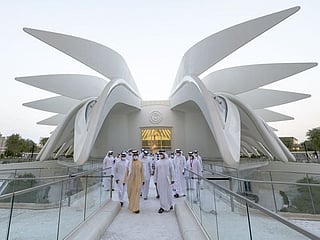New COVID-19 safety rules for UAE mosques
Women's prayer halls to reopen; imams and cleaners must be vaccinated

Dubai: The UAE on Tuesday announced that women's prayer halls across the country’s mosques and prayer rooms on external roads will be reopened, the Emirates News Agency (WAM) reported.
Speaking during the weekly media briefing, Dr. Saif Al Dhaheri, the official spokesman of the National Crisis and Emergency Management Authority (NCEMA), said the decision was taken in coordination with the General Authority for Islamic Affairs and Endowments.
The updated protocol includes opening prayer areas on external roads, places of ablution and women’s prayer areas, Dr. Al Dhaheri said. Workers in mosques and prayer areas must print guideline flyers about the precautionary measures in Arabic, English and Urdu, he noted.
The protocol also includes opening ablution areas but stipulates that a closed ablution tub must be in place between two open tubs, and toilet paper must be provided, while direct contact between ablution areas and mosques must be prevented, he further added.
"The protocol also stipulates the necessity of cleaning and sanitising toilets and ablution areas before every prayer, along with respecting a 1.5-metre physical distancing between worshippers," Dr. Al Dhaheri further said. He pointed out that mosques will be closed after prayers and no one will be allowed to stay inside, and full adherence to previously announced precautionary measures must be maintained.
Regarding the use of toilets and restrooms, the administrations of mosques must have cleaning staff available at all times, sanitisers should be available at the exits of ablution areas and everyone should sanitise their hands after ablution. Instructions will be provided on the easiest and correct methods of ablution, he further said and added that cleaning staff are required to clean and sanitise areas of ablution and toilets after the end of ablution.
The protocol has assigned relevant authorities to monitor any violations by people coming for prayers, as well as coordinate with relevant companies to ensure the cleaning and sanitisation of ablution areas and toilets before every prayer, he noted.
He also stressed the importance of the coordination between relevant authorities and local municipalities in adopting actions plans and tools for sanitisation. He affirmed that the Imams and cleaning staff of mosques should be vaccinated, undergo a PCR test every 14 days, be registered on the Al Hosn application, disclose any symptoms and avoid being present in mosques if they have such symptoms.
Dr. Al Dhaheri stressed the UAE is still on the right track towards full recovery, due to the significant efforts of all public and private authorities.
"The approach of the UAE Government aims to ensure decent lives and a safe future for all citizens and residents in the UAE, and we trust the vision of our leadership," he said. The health sector is continuing its efforts to achieve herd immunity, by providing vaccines to eligible people, and noting that 98.66 percent of the population have received the first dose of the vaccine while 88.57 percent are fully vaccinated, he added.
He then pointed out that the UAE’s health sector, in collaboration and coordination with all relevant authorities, is constantly assessing the pandemic in the countries witnessing newly discovered variants. He highlighted the key role of the community in ensuring the return to a new normalcy and lauded the efforts of the Emirati community and its adherence to the instructions of relevant authorities.
Everyone is responsible for protecting and maintaining the country’s achievements over the past two years, he affirmed, stating, "We urge the public to adhere to relevant precautionary measures amidst a gradual openness and official events and celebrations."






